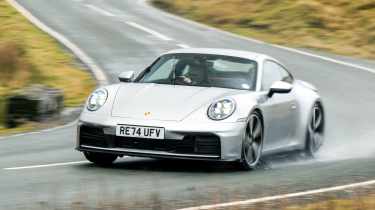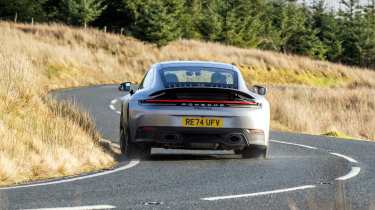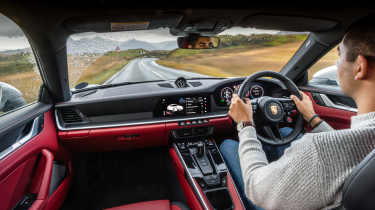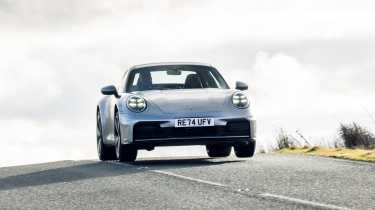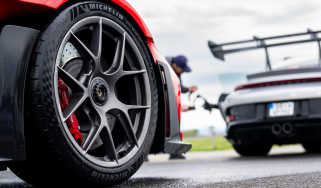Porsche 911 Carrera (992.2) 2025 review – is the most basic 911 the sweet-spot?
Hybrids and more extreme variants of the 992.2 have been hogging the headlines, but the basic 911 Carrera still has plenty to offer
When the 992.2 GTS – the first ever hybrid 911 – launched last year, the revised Carrera was ushered in behind it without much fanfare. All the talk was about the GTS’s (brilliantly executed) e-motor and electric turbo combination, and its new 3.6-litre flat-six engine – technology that will no doubt find a home in other 992.2s. The new Carrera, on the other hand, is a minor revision of the 992 we know well – and didn’t completely fall for when we first drove it five years ago, it must be said. Highly competent but wider at the hips and heavier than the 991, some of the intimacy and tactility of the driving experience, the essential 911 character, had been lost. Some even accused it of feeling like a Panamera coupe.
Having tested it on some of the UK's greatest driving roads in all manner of conditions, it’s hard to imagine anyone climbing out of the 992.2 Carrera and making that comparison. It feels like a proper sports car. Not the kind that leaves you buzzing and breathless after a good drive, but a purpose-built tool that’s been honed to a high level in every respect. The strange thing is, not a great deal has changed in the ‘dot two’ transformation – at least from what Porsche is letting on. Power still comes from a non-hybrid 3-litre flat-six, revised with twin-turbos from the outgoing GTS and an intercooler from the Turbo. Emissions have been reduced yet power is up slightly to 389bhp (+9bhp), and torque remains at 332lb ft. That isn’t a great deal in today’s world of 400bhp-plus AMG A-classes, but 911s have a habit of making every scrap of power count. Porsche hasn’t detailed any chassis modifications, but there are sure to be some minor tweaks and calibration changes.
The design has been tightened up, too, with new bumpers leaving the Carrera looking tauter and a little less bloated at the rear, like it’s been frequenting the squat rack. It looks right at home tucked up in a lay-by in a glorious Welsh valley, although the staggered 20/21-inch Fuchs-style alloys are a bit of a retro pastiche and leave huge open spaces between the spokes for a clear view of the suspension (still MacPherson strut front, multi-link rear, with PASM adaptive dampers). As we’ll find out, the big wheels also give the 992 a fiddly low-speed ride – the standard 19/20-inch combination is probably a better bet.
More reviews
Group tests
Long term tests
Reviews
- Porsche 911 Carrera S 2025 review – a 473bhp BMW M4 CS fighter
- Porsche 911 GT3 (992.2) 2025 review – the best GT3 yet?
- Used Porsche 911 GT3 (991, 2013 - 2019) review, specs and buying guide
- Porsche 911 Targa 4 GTS 2025 review – the 911 that shouldn’t make sense
- Porsche 911 Carrera GTS 2025 review – the best 992 Carrera yet
Tug the pop-out door handle, climb in and the 992.2 is business as usual, but more digitised and a little less special than the car it replaces. The driving position is low and purposeful, but behind the small-diameter, slim-rimmed wheel you’ll find a fully digital dash without the traditional central analogue rev-counter. More functional but infinitely less appealing. Other developments include a revised driver assistance lever (for the cruise control etc) and an engine start button in place of the old ignition switch. Quality is good but fit and finish still doesn’t feel up to the level of the pre-turbocharged Carreras with their tight tolerances and precision switchgear. There’s still a sense of bulk around you, too, the bulging rear arches filling the mirrors and the fat 305-section Pirellis often thumping over catseyes.
But, width aside, there’s an immediate familiarity and reassurance to the way the Carrera goes down the road. It operates with clean precision and always seems to give back exactly what you demand through the controls, never overly bright or hyper-alert. That’s why even in conditions that would normally have you nervously twitching at the wheel, eyes on stalks, you can quickly feel your way up to the limit and drive in that zone without second-guessing the car. We’re not talking McLaren levels of feel and feedback, but there’s a sense of cohesion that generally only comes from years of development and close attention to detail.
Though the 911 is bigger and more complex than ever, it’s also fantastically versatile and easy to operate. You can trundle through towns and across country, playlists thumping through the Burmester sound system and the nose stuffed full of kit, exhaust valves closed, engine hushed. It’s not a serene cruiser but the 992 is never harsh or combative. It can be on your ears, however, as the tyres still kick up a racket over poor surfaces at speed. Nothing the Burmester can’t drown out – or the flat-six, when the opportunity arises.
Sport Plus is the mode of choice around here. Wet is the most friendly in that it softens the throttle and dulls the engine, helping you find your feet in the, erm, wet, but there’s always a sense that the chassis can deal with more. The immediacy in Sport Plus means you can chase the throttle and work the rear the moment you spot your exit, riding out a hint of squirm and slip, the car feeling more alive. If this was the kind of hammer-blow turbo engine you get in an M car, you’d probably want to rein it back, but the Carrera’s 3-litre feels almost naturally aspirated in how linear and manageable its torque delivery is. With the sports exhaust breathing through open valves you get a full, flat-six howl from inside the cabin, too (and an even better noise from outside, according to evo photographer Aston Parrott), building to a satisfying peak at the top end.
On these technical roads, which have streams flowing across them in places, 5000rpm is about all you need to really get moving. But in the moments when you can wind out to the 7500rpm cut-off, the Carrera feels energised, and gearchanges from the eight-speed PDK snap home with clinical speed. You need to time your shifts and keep the engine revving and primed to get the absolute best from it, but the powertrain feels really polished and punches much harder than you’d expect for a sub-400bhp car.
Where this 992 lacks a bit of sophistication is in its ride quality. At low speed it doesn’t tackle bumps in a single fluid motion, and it sometimes struggles to control those big alloys bobbing up and down in the arches. You can switch between damper settings independently of the drive modes, and in the wet the softer setting allows the body to shift around a little more to give the tyres purchase. Later, when dry patches emerge, tyre temperatures pick up by some 20 degrees(!) and grip increases, the extra support and tighter vertical control of the firmer mode proving a good match. There’s still an underlying busyness at speed, but control and composure to spare.
It’s at these higher loads that you can start to subtly (or not so subtly) work both axles to use the 911’s balance to your advantage. The brakes are progressive with excellent pedal feel, and you can use them to lean hard on the front end, without an unnerving sense that the rear is about to skate from underneath you. Then it’s all about how early you can get on the throttle and use that traction, which is so strong that you quickly find yourself winding back the stability control to PSM Sport, or switching it off completely. Over-drive and be aggressive with the throttle and the Carrera eventually shows its more playful side, the rear breaking away and swiftly snapping back once those Pirellis find grip again.
Does it instantly feel like a 911? In some ways yes, but the typical rear-engined traits don’t shout at you straight away. They’ve been polished out to a degree, and you don’t need to drive to its strengths like you would in an older car. But those strengths are there, and you tend to notice them once you’ve taken a series of turns at a lick. The fantastic traction, the way it finds forward drive even while sliding, and how keenly it turns in on a trailing throttle are all 911 hallmarks, but they meld into the driving experience rather than being completely central to it.
So the Carrera does pretty much what you ask of it, and does so with a consistency that builds trust as each corner ticks by. But there is a nagging sense that some rawness and feel (through the steering in particular) has been left on the table, things that would tip the Carrera towards being a genuinely thrilling sports car, rather than just a superbly competent one. That is, of course, by design, because the 911 Carrera T exists. That sounds like the car to deliver a richer no-frills 992 driving experience, being 42kg lighter, three-pedal-only and sitting lower on retuned suspension with rear-wheel steering.
Price and rivals
As it stands, this feels like a good place for the base Carrera to be. Yes, it’d be even better if it was smaller, a little more feelsome and 100kg or so lighter, but that’s been said pretty much every time a new 911 has come around. Less forgivable is the price, because the most basic 992.2 will cost you – wait for it – £99,800. And this example with a few big-ticket options such as 18-way adjustable sports seats, a sports exhaust and that Burmester sound system is a £124,000 car. That was GT3 money not too long ago. But even at that price, it’s harder than ever to find anything directly comparable with the basic Carrera.
While the 992 originally launched into a world of Evoras, Vantages and AMG GTs, they’ve all either disappeared or changed tack. The Aston Martin Vantage is now a £165,000, 656bhp brute, the only similarly priced Mercedes-AMG GT has a 2-litre four-pot, and the base Lotus Emira is much cheaper (£81,495) but less rounded, and also comes with an AMG hot hatch engine. As ever, it’ll take a different kind of approach, an alternative flavour of sports coupe, to take on the 911 at its own game. Maybe something like the newly updated BMW M4 Competition. Stay tuned for that test...

